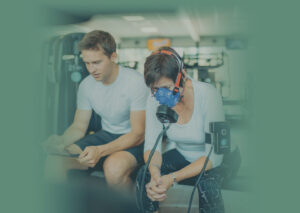Exercise and the immune system
Regular exercise supports the important disease-fighting functions of our immune system. People who exercise are therefore generally better protected against infectious diseases. However, this protective effect cannot be achieved with every type of exercise - incorrect strain and overtraining can even have the opposite effect.
In this episode of DYNO TV, we explain how exercise influences our immune system and what differences can be achieved through training in the
aerobic and in the
anaerobic metabolic range result. We also explain what training professionals mean by the term
"Open window effect" and what significance it has for the stable function of the immune system.
You are currently viewing a placeholder content from Vimeo. To access the actual content, click the button below. Please note that doing so will share data with third-party providers.
More Information
Aerobic training acts as a booster for our immune system
It has long been known that a reasonable amount of exercise has a positive effect on our health. There are now numerous scientific studies on this topic, some of which have also investigated the importance of physical training for the immune system. The findings from these studies are extremely interesting: on the one hand, they prove that there is a direct correlation between a
a stable and strong immune system and a goal-oriented, balanced training program. On the other hand, it can also be seen that the intensity of exercise plays a decisive role in the effects of sport on the body.
Immune system plays: If you exercise too intensively, you risk weakening your immune system in the long term.
How can these effects on our immune system be explained? It's simple: when we exercise, our body's own control circuits adapt to the new situation. For example, more energy is made available, the supply of oxygen is increased and, among other things, there is an increased release of the stress hormone adrenaline. This physiological reaction also activates our immune system. Within just a few seconds, the body's own defense cells multiply or are activated.
However, this activation boost for the immune system does not take place equally effectively in every metabolic area of training. Ideally, you should train in the aerobically effective range. There is no generally valid value for the aerobically effective metabolic range; it takes place in a different load and pulse range for each person and must therefore be determined individually. Once the aerobic range is known, your own immune system can be strengthened against viral, bacterial or parasitic attackers through targeted training in this range.
When consciously training to strengthen the immune system, it is important to bear in mind that over-intensive training can have detrimental effects. The technical term for this is
"Open window effect". It describes a reaction of the immune system to intense stress in the anaerobic metabolic range, which temporarily causes a certain instability of the immune cells. This is caused by various physiological reactions to the particularly intense physical exertion. More adrenaline is released, which initially increases the number of important defense cells such as B and T lymphocytes and granulocytes, but then rapidly decreases again. This effect lasts for up to 72 hours. During this period, the body's defenses are weakened and we become more susceptible to infections.
To prevent the
"Open window effect" To avoid this, training should be individually adapted and sporting activity or exercise in the fresh air in general should always be carried out in the personal fat metabolism range. For example, two to three units between 45-60 minutes per week in the aerobic pulse sector are suitable for this, which, according to studies, already lead to an immense improvement in the individual's immune defense. The decisive factor here is quite simply the correct dosage of exercise intensity.
Another aspect should also be taken into account: Exercising too frequently above the individual anaerobic threshold not only results in a temporary weakening of the immune defense, but also in negative effects on the body's muscles and the structures connected to them, such as ligaments, tendons and other tissues. These consequences of overtraining arise because acid in the muscles can no longer be adequately broken down. This prevents sufficient regeneration during the recovery phase, the body is generally weakened and performance decreases.
Conclusion:
Aerobic training acts as a booster for our immune system - one can rightly speak of
"Movement as a medicine" speak. Excessively intensive training, on the other hand, weakens the body's defenses and individual performance.
Do you have any questions? Feel free to
Contact us! We are looking forward to your message.







